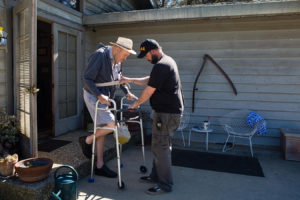Tag: Judith Stein
Home Health Care Providers Struggle With State Laws And Medicare Rules As Demand Rises
“We can send prescriptions to the pharmacy, including [for] narcotics,” says Marie Grosh, a geriatric advanced practice nurse practitioner and the owner of a medical house calls practice in a Cleveland suburb. “We can order lab work, x-rays, ultrasounds, EKGs [electrocardiagrams]; interpret them; and treat patients based on that. But we’re just not allowed to order home care—which is absurd.”
By SUSAN JAFFE | Health Affairs | June 2019 | Volume 38, Number 8
 When Christine Williams began working as a nurse practitioner some forty years ago in Detroit, Michigan, older adults who couldn’t manage on their own and had no family nearby and no doctor willing to make house calls had few options besides winding up in a nursing home.
When Christine Williams began working as a nurse practitioner some forty years ago in Detroit, Michigan, older adults who couldn’t manage on their own and had no family nearby and no doctor willing to make house calls had few options besides winding up in a nursing home.
Not anymore.

Home check: Nurse practitioner Marie Grosh visits Leroy Zacharias at his home in a Cleveland suburb, He has Parkinson disease, and Grosh says he would be living in a nursing home if he couldn’t get medical care at home. (Photo by Lynn Ischay.)
“The move towards keeping seniors in their homes is a fast-galloping horse here,” says Williams, who settled in Cleveland, Ohio, more than a decade ago. “We don’t have space for them in long-term care [facilities], they don’t want to be in long-term care, and states don’t want to pay for long-term care. And everybody wants to live at home.”
But despite the growing desire for in-home medical care for older adults from nearly all quarters, seniors’ advocates and home health professionals claim that rules set by the Centers for Medicare and Medicaid Services (CMS) along with state regulations have created an obstacle course for the very providers best positioned—and sometimes the only option—to offer that care. [Continued here] …
Lifting Therapy Caps Is A Load Off Medicare Patients’ Shoulders
Last month’s budget deal means Medicare beneficiaries are eligible for physical and occupational therapy indefinitely. Plus, prescription drug costs will fall for more seniors.
By Susan Jaffe | Kaiser Health News | March 14, 2018 | This KHN story also ran on 
Physical therapy helps Leon Beers, 73, get out of bed in the morning and

Leon Beers gets help from caregiver Timothy Wehe. (Bert Johnson for KHN)
maneuver around his home using his walker. Other treatment strengthens his throat muscles so that he can communicate and swallow food, said his sister Karen Morse. But in mid-January, his home health care agency told Morse it could no longer provide these services because he had used all his therapy benefits allowed under Medicare for the year.
… Under a recent change in federal law, people who qualify for Medicare’s [physical, occupational and speech] therapy services will no longer lose them solely because they used too much.
“It is a great idea,” said Beers. “It will help me get back to walking.” [Continued at Kaiser Health News, NPR and The Washington Post]
…
Judge Accepts Medicare’s Plan To Remedy Misunderstanding On Therapy Coverage
By Susan Jaffe | Kaiser Health News | February 3, 2017 | This KHN story also ran on ![]()
A federal judge has accepted Medicare’s plans to try once more to correct a commonly held misconception that beneficiaries’ are eligible for coverage for physical and occupational therapy and other skilled care only if their health is improving.
“Confusion over the Improvement Standard persists,” wrote U.S. District Court Chief Judge Christina Reiss in Vermont in a decision released by the court Thursday. Advocates for seniors say coverage is often mistakenly denied simply because the beneficiary reaches “a plateau” and is no longer making progress.[Continued at Kaiser Health News and NPR]…
Democrats back Clinton, progressive platform at DNC in Philadelphia
Susan Jaffe | Washington Correspondent for The Lancet | 29 July 2016![]()
Vermont Sen. Bernie Sanders stressed the need for unity when he addressed the convention on its first day, citing the Democratic party platform as evidence of the gains his supporters have achieved. “It is no secret that Hillary Clinton and I disagree on a number of issues … that’s what democracy is about,” Sanders told the convention. “But I am happy to tell you that at the Democratic Platform Committee, there was a significant coming together between the two campaigns and we produced, by far, the most progressive platform in the history of the Democratic Party.” [continued here] [listen to podcast here]…
As HHS Moves To End Overload Of Medicare Claims Appeals, Beneficiaries Will Get Top Priority
By Susan Jaffe Jan. 21, 2014 KAISER HEALTH NEWS in collaboration with![]()
Medicare beneficiaries who have been waiting months and even years for a hearing on their appeals for coverage may soon get a break as their cases take top priority in an effort to remedy a massive backlog.
Nancy Griswold, the chief judge of the Office of Medicare Hearings and Appeals (OMHA), announced in a memo sent last month to more than 900 appellants and health care associations that her office has a backlog of nearly 357,000 claims. In response, she said the agency has suspended acting on new requests for hearings filed by hospitals, doctors, nursing homes and other health care providers, which make up nearly 90 percent of the cases. But beneficiaries’ appeals will continue to be processed.
“We have elderly or disabled Medicare clients waiting as long as two years for a hearing and nine months for a decision,” said Judith Stein, executive director of the Center for Medicare Advocacy. [More from KHN] [More from Washington Post]…
 rgeries so risky for older adults that that the insurance program
rgeries so risky for older adults that that the insurance program